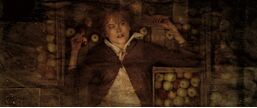"Dogtown" and the alienation effect
Lars von Trier's distinctive style has caused a lot of controversy, but this is not a topic we want to discuss. Acknowledging that Dogtown is somehow good and unique probably won't attract a lot of skepticism. Those who appreciate it will be excited to find that there is an eye-catching stage play style; those who question him, as Jiang Wen once commented, believe that "here, it incites more than conquers."
Let's start with a certain kind of "kinship" between "Dogtown" and drama.
Obviously, a certain style reflected in "Dogtown" can be explained by the "distancing effect" of the famous drama master Brecht. However, the application of this abstract formula cannot satisfy us only with the rough coverage of a theoretical term. We should at least ask, what is the alienation effect? How does it do it here? What is the effect it causes?
In fact, as some have pointed out, the alienation effect is not fundamentally a total objection to the invention of the theatrical tradition; it is part of the theatrical tradition that has had many manifestations throughout its long history, as Brecht did in Mei Lanfang's play. The phenomenon of alienation effects has long existed in art, as has been found in art. Brecht refined it and formed a dramatic theory system, which finally became an important part of the "resistance trend" of 20th century modernist drama against the naturalistic drama that had reached the peak of maturity, and it also had an impact on the world after it. Significant influence.
In this trend, however, there have been some attempts at expressionism and symbolism that preceded Brecht's narrative drama, and that at its extremity the absurdist drama; therefore, Brecht's Narrative drama is justified as a kind of "hybrid drama" or "intermediate drama": it is determined to abandon traditional naturalism, that the fullness of the actors and the empathy of the audience are "not allowed for a minute", they It is necessary to keep a distance from the stage in order to think rationally; at the same time, it does not require the ultimate "distancing effect" (as seen in the absurdist school), because after all, it has the pursuit of "realism", too much. Abstraction and complexity will make the audience's thinking lose its fulcrum.
It is at this point that Brecht's alienating effect is called into question. It can be said that the contradiction of seeking some kind of compromise within it is natural, so it is doomed to be unwise to take it as a guideline: we must find limitations and restrictions for it, in order to achieve the unity of aesthetic laws and practical effects. And this process will be arduous, including Brecht's own personal practice has confirmed this.
In Dogtown, there is no doubt that the unique scenography played an important role in the alienation effect. The space is presented here as a pure stage: we know from the beginning that there is of course no illusion of life here, and its performative nature is almost obvious to passersby. In addition, of course, there are also the narrative structure of chapters and the omniscient narrative method of narration, the overhead shots and stage-style lighting that often emerge, and the thinking gap left by long shots... But this means, Are we separated?
To some extent yes, but no. Say yes, because we do have something to think about here, especially after the story takes a nosedive. Compared with some commercial films that are completely won by the continuous and tight action plots or "unintelligible" pure art films, we have a lot of room for thinking here, and it is quite fruitful. If you say no, you only need to study the characters and plot of this film, and you may be able to have some doubts.
In my opinion, the performance of the characters in this film (their actions, language, expressions, etc.) and the way they are presented, achieve a very low degree of alienation. As audiences, our resonance is present here, and can be seen in almost every episode; we can be said to be quite emotional about everyone and everything that happens in Dogtown - emotion overwhelms reason, in Brinell looked like maybe it would be a complete failure. But after all, isn't this weird space appearing alive in front of our eyes? Why is there a moment of "failure" (and not short-lived) at all? On the one hand, it might be said that a certain "space fatigue" has arisen here. In the 3-hour plot, we can indeed make the setting of the "stage world" change from unfamiliar to familiar, to the point of ignoring it or even walking into it. In Brinell's plays it is common for different means of alienation to take turns; here, when we develop some resistance, the director's old tricks fail. On the other hand, as we have seen, after being familiar with this stage, its own purpose (to separate us) can even be said to be completely subverted. The scene in which Grace is raped is powerful: the space is so naked, the people are so close, everything is happening clearly in front of everyone's eyes - it may be shameful to think at such a moment, After all, with such a catastrophe in front of our eyes, what else can we do but greet it emotionally? It eventually became an emotional feast. The failure of the alienation effect here is evident.
And we also have reasons to say that in "Dog Town", it is almost "anti-alienation", and reason eventually becomes the ladder of emotions. Let's sort through the whole thing. What happened in "Dog Town" is of course a horror fable-style story: a kind rich girl fled the city, sought refuge in Dog Town, experienced the changes before and after the residents of Dog Town, endured inhuman pain, and finally realized-- They were unsalvageable, unforgivable, and in the end she destroyed it herself in gunfire and flames. It's an instructive story, with a certain allure and appeal—because it's diametrically opposed to traditional mainstream discourse. But isn't that all there is to it?
Just like the mainstream discourse it opposes, Dogtown is exactly the opposite of it, and it's tight, without any gaps: here we can see how the same set of operations works for both effect. In the mainstream narrative, first of all, there must be a conclusion, a principled thing, all the plots and characters are bound to revolve around it, and the development proceeds from this, showing a set of classical logic.
In Dogtown, the situation is of course the same. Starting from the evil of man, all the characters are designed, all the plots are advanced in an orderly manner, until the moment when the conclusion manifests itself: the moment of Grace's revenge, the bullets and flames reduced the dog town to ashes, Grace embraces power and runs into the city with her father—and the beast as a metaphor for man, the dog who "gets away", finally emerges as the last resident of Dogtown, staring at us across the screen.
"Dog nature is human nature", taking this as a starting point, we will have a clear understanding of the characters in this film. Psychological changes and character development do not exist in them, they are just manipulated puppets, flat existences, tributes to the conclusion - if anyone sees a beautiful heart flashing in them, On the one hand, it can be said that this is hypocrisy; on the other hand, it is of course necessary for the plot. So we will see how "arrogant" Grace is. Her pure soul is of course sudden and inexplicable, and it is a "reaction force" that opposes the conclusion, and will inevitably prove the legitimacy of the conclusion with her own failure; and How reasonable her tolerance of torture is that it needs no explanation, as long as we see it as necessary.
So we can see what position the alienation effect occupies here. It does play some part, but this is secondary; it quickly compromises, reason quickly submits to emotion in order to eliminate its own contradictions. And the director's approach may not be exemplary, using the tools left by the alienation effect to turn to its most objectionable parts and to demonstrate the power of emotion (though of course it doesn't need to be proven). So in this system, there are not too many really creative things, and very few things are hidden. After all, this is as unnatural as the mainstream narrative, and there is nothing under it. The audience is not so much thinking in watching the film as being thought - what is presented here is an excellent use of rhetoric, which strikes us in a completely lyrical way, seducing us to its "self-evident" conclusions. In other words, reason is secondary, even excluded.
It must be noted that the failure of the alienation effect here of course refers to the state presented by the film itself. After the passion, it is of course possible to carry out multi-faceted research on the film and to think rationally (if we are doing such a thing); but of course it is not a level. It can't be entirely attributed to it; just as Dogtown's distortion of certain kinds of truth cannot be entirely attributed to reality. This reality does exist after all. Most people are powerless to have any real awareness of it, but in the lyricism of the anti-mainstream narrative, perhaps a vigilance can be harvested. In this sense, although Dogtown treats the alienation effect as a low-end tool, its anti-mainstream rhetorical art deserves the same, perhaps overrated, evaluation as mainstream rhetorical art.
View more about Dogville reviews











